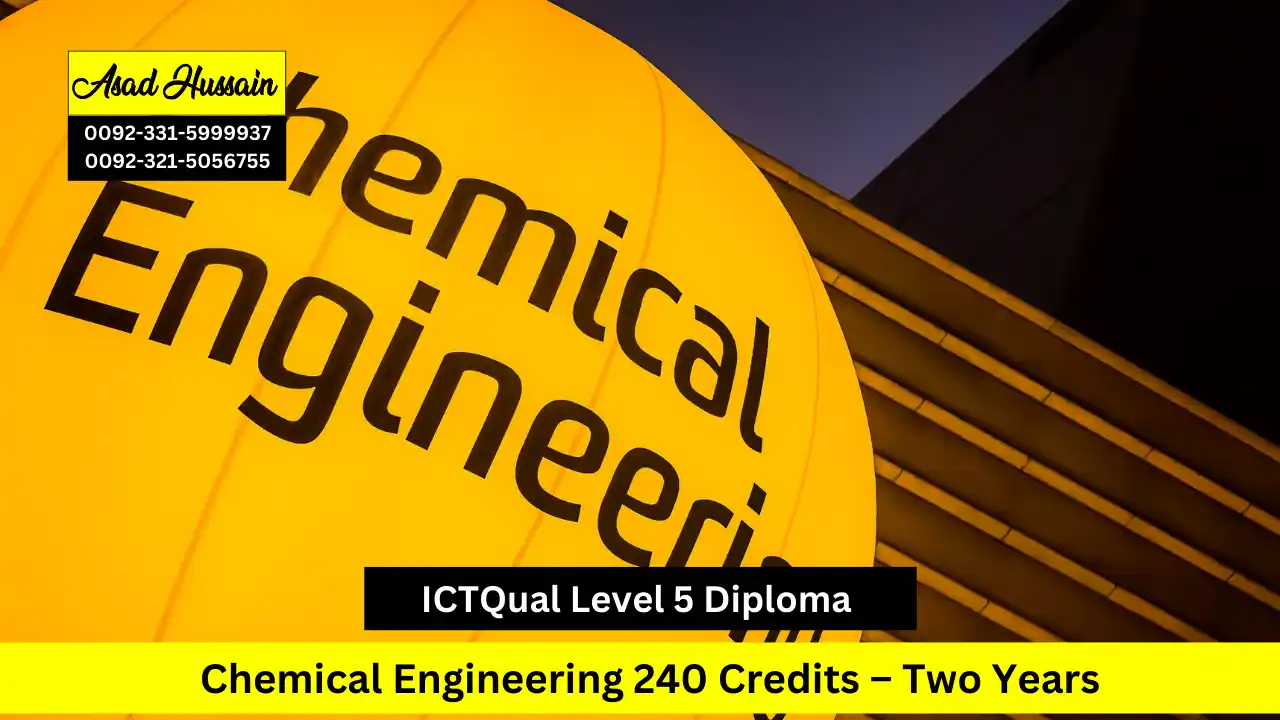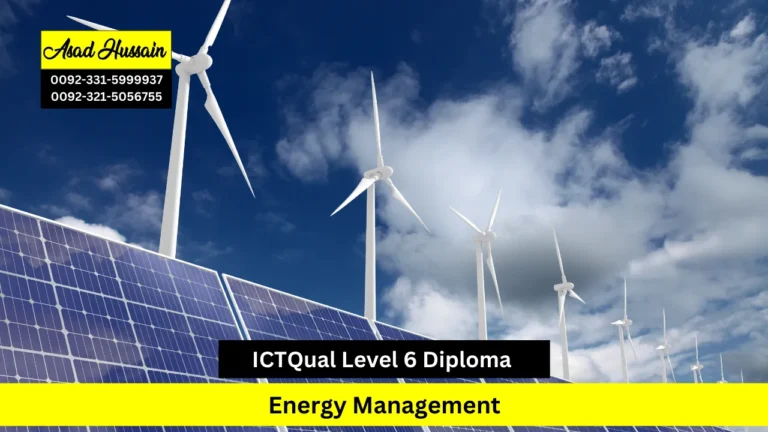In the rapidly evolving field of chemical engineering, professionals need specialized qualifications that not only provide deep technical knowledge but also equip them with the skills to solve complex industrial problems. One such qualification is the ICTQual Level 5 Diploma in Chemical Engineering (240 Credits), a comprehensive two-year program that paves the way for aspiring engineers to excel in the dynamic world of chemical processes and systems.
The ICTQual Level 5 Diploma in Chemical Engineering is an advanced qualification designed for those who want to pursue a career in chemical engineering. Spanning two years, this diploma program offers 240 credits, making it equivalent to the second year of a university degree. It provides a blend of theoretical knowledge, practical skills, and industry-oriented training, ensuring graduates are equipped to meet the challenges of the field.
The ICTQual Level 5 Diploma in Chemical Engineering (240 Credits) offers a robust pathway to becoming a skilled chemical engineer. With its comprehensive curriculum, practical approach, and strong industry recognition, this two-year program equips students with the necessary knowledge and skills to thrive in the competitive and dynamic world of chemical engineering. Whether you are looking to start your career in chemical engineering or enhance your existing knowledge, this diploma can serve as an invaluable stepping stone toward achieving your professional goals.
Program Highlights
Year 1 (120 Credits)
Semester 1
- Introduction to Chemical Engineering Principles
- Engineering Mathematics and Statistics
- Material and Energy Balances
- Thermodynamics
- Chemistry for Engineers
- Fluid Mechanics
Semester 2
- Heat Transfer Processes
- Chemical Process Industries
- Mechanical Properties of Materials
- Laboratory Skills and Safety
- Environmental Science and Sustainability
- Technical Communication and Report Writing
Year 2 (120 Credits)
Semester 1
- Advanced Thermodynamics
- Advance Fluid Mechanics
- Process Control and Instrumentation
- Chemical Reaction Engineering
- Separation Processes
- Industrial Health and Safety Management
Semester 2
- Chemical Process Design and Simulation
- Advanced Separation Processes
- Energy Systems and Renewable Technologies
- Advance Chemical Reaction Engineering
- Industrial Project Management
- Research Project in Chemical Engineering
To enroll in the ICTQual Level 5 Diploma in Chemical Engineering (240 Credits – 2 Years), candidates must meet the following entry requirements:
- Educational Qualifications: Applicants should hold a Level 4 qualification, such as a diploma, certificate, or equivalent, in a relevant field. A background in subjects like chemistry, physics, mathematics, or engineering is highly recommended, as the course builds upon these foundational concepts in chemical engineering.
- Age Requirement: Candidates must be at least 18 years old to ensure they are prepared to manage the academic and practical demands of the program.
- English Proficiency: Strong proficiency in English is required, as students must engage with technical terminology, complete written assignments, and communicate effectively in the chemical engineering field.
- Technical Skills: Basic computer skills are necessary, as the program includes assignments, simulations, and the use of engineering software for process design and analysis.
- Relevant Experience (Optional): While not required, prior experience with chemical engineering concepts, laboratory work, or industrial processes can be beneficial, enhancing understanding and performance throughout the course.
Here are the Learning Outcomes for each study unit in the ICTQual Level 5 Diploma in Chemical Engineering (240 Credits – Two Year):
Year 1 (120 Credits)
Semester 1
Introduction to Chemical Engineering Principles
- Understand the role of chemical engineering in industrial processes.
- Analyze basic principles such as mass transfer, fluid flow, and heat exchange.
- Apply fundamental engineering concepts to solve chemical process problems.
Engineering Mathematics and Statistics
- Utilize advanced mathematical techniques for engineering problem-solving.
- Interpret statistical data relevant to chemical processes.
- Develop mathematical models for process simulations.
Material and Energy Balances
- Perform mass and energy balance calculations for chemical systems.
- Evaluate process efficiency and resource utilization.
- Apply conservation principles to real-world chemical engineering scenarios.
Thermodynamics
- Explain thermodynamic principles related to energy and material transformations.
- Solve problems involving the first and second laws of thermodynamics.
- Analyze phase equilibrium and thermodynamic properties of substances.
Chemistry for Engineers
- Understand the chemical principles underpinning engineering processes.
- Analyze chemical reactions, stoichiometry, and kinetics.
- Evaluate the behavior of materials in various chemical environments.
Fluid Mechanics
- Explain fluid properties and their impact on process systems.
- Design and analyze fluid flow systems using Bernoulli’s equation and other principles.
- Solve engineering problems involving pumps, turbines, and pipe networks.
Semester 2
Heat Transfer Processes
- Understand conduction, convection, and radiation heat transfer mechanisms.
- Design and analyze heat exchangers for industrial applications.
- Evaluate thermal efficiency and optimize heat transfer systems.
Chemical Process Industries
- Analyze key chemical industries, including petrochemical, pharmaceutical, and food processing.
- Evaluate industrial processes from raw material to final product.
- Understand economic and environmental factors in chemical production.
Mechanical Properties of Materials
- Understand material behavior under stress, strain, and temperature variations.
- Evaluate materials for use in chemical engineering applications.
- Analyze failure modes and select appropriate materials for specific processes.
Laboratory Skills and Safety
- Develop practical laboratory skills for chemical analysis and engineering experiments.
- Follow safety protocols and risk assessments in laboratory environments.
- Accurately record, analyze, and interpret experimental data.
Environmental Science and Sustainability
- Understand environmental impacts of chemical engineering processes.
- Develop sustainable engineering solutions for waste management and energy efficiency.
- Analyze regulatory requirements for environmental protection.
Technical Communication and Report Writing
- Develop technical writing skills for clear and concise communication.
- Prepare comprehensive engineering reports and documentation.
- Present technical findings effectively to varied audiences.
Year 2 (120 Credits)
Semester 1
Advanced Thermodynamics
- Analyze advanced thermodynamic cycles and systems.
- Solve complex problems involving multi-phase and non-ideal systems.
- Apply thermodynamic principles to optimize industrial processes.
Advanced Fluid Mechanics
- Understand advanced concepts in fluid dynamics, including turbulence and compressible flow.
- Design and optimize fluid transport systems.
- Use computational tools to model fluid behavior in engineering systems.
Process Control and Instrumentation
- Understand process control principles, including feedback and feedforward systems.
- Design control strategies for industrial chemical processes.
- Use modern instrumentation and sensors for process monitoring.
Chemical Reaction Engineering
- Analyze reaction kinetics and reactor design.
- Optimize chemical reactors for efficiency and safety.
- Apply modeling techniques to scale up chemical reactions from lab to industry.
Separation Processes
- Understand principles of separation techniques such as distillation, filtration, and chromatography.
- Design and evaluate industrial separation systems.
- Optimize separation processes for cost and energy efficiency.
Industrial Health and Safety Management
- Analyze risks associated with chemical engineering processes.
- Develop safety management plans and emergency protocols.
- Ensure compliance with health and safety regulations in industrial environments.
Semester 2
Chemical Process Design and Simulation
- Use simulation tools to design and analyze chemical processes.
- Develop process flow diagrams and identify optimization opportunities.
- Evaluate the economic feasibility of chemical process designs.
Advanced Separation Processes
- Understand complex separation techniques, including membrane processes and crystallization.
- Design advanced systems for high-purity product requirements.
- Evaluate environmental impacts of separation technologies.
Energy Systems and Renewable Technologies
- Analyze energy systems and their applications in chemical engineering.
- Develop solutions using renewable energy technologies in process industries.
- Evaluate energy efficiency and sustainability in industrial processes.
Advanced Chemical Reaction Engineering
- Explore complex reaction mechanisms and multi-reaction systems.
- Optimize catalytic and non-catalytic reactions in industrial reactors.
- Apply computational tools to model reaction engineering systems.
Industrial Project Management
- Plan, execute, and monitor industrial engineering projects.
- Apply project management tools and techniques to chemical process industries.
- Ensure projects are completed on time, within scope, and on budget.
Research Project in Chemical Engineering
- Conduct independent research on a chemical engineering topic.
- Apply theoretical knowledge to practical problems through experiments or simulations.
- Present findings through detailed reports and presentations.
The ICTQual Level 5 Diploma in Chemical Engineering (240 Credits – Two Years) is ideal for a range of individuals who are looking to advance their knowledge and skills in the field of chemical engineering. Specifically, this course is designed for:
1. Aspiring Chemical Engineers
Individuals who wish to pursue a career in chemical engineering and gain a deep understanding of the core principles and practices in the field. This qualification serves as a stepping stone toward more advanced studies or direct entry into the chemical engineering profession.
2. Engineering Technicians and Professionals
Those who are already working in the engineering sector and wish to specialize in chemical engineering. The course provides an opportunity for career advancement and a deeper understanding of chemical processes and systems.
3. Graduates from Related Disciplines
People with academic qualifications in related fields such as chemistry, physics, or mechanical engineering, who are looking to transition into chemical engineering. The diploma builds upon their existing knowledge while introducing chemical engineering concepts.
4. Industry Professionals Seeking Career Growth
Current professionals in industries such as manufacturing, pharmaceuticals, energy, or environmental engineering who want to enhance their qualifications, expand their expertise, and improve their job prospects in the chemical engineering field.
5. Individuals Seeking Hands-On, Practical Knowledge
Those who prefer a balance between theoretical learning and practical experience. The course includes laboratory work, simulations, and project-based assignments, making it a good fit for those who want to apply what they learn in real-world scenarios.
6. International Students
The qualification is recognized globally, making it an excellent choice for individuals looking for international career opportunities in chemical engineering, particularly in industries that require technical expertise and practical knowledge.







